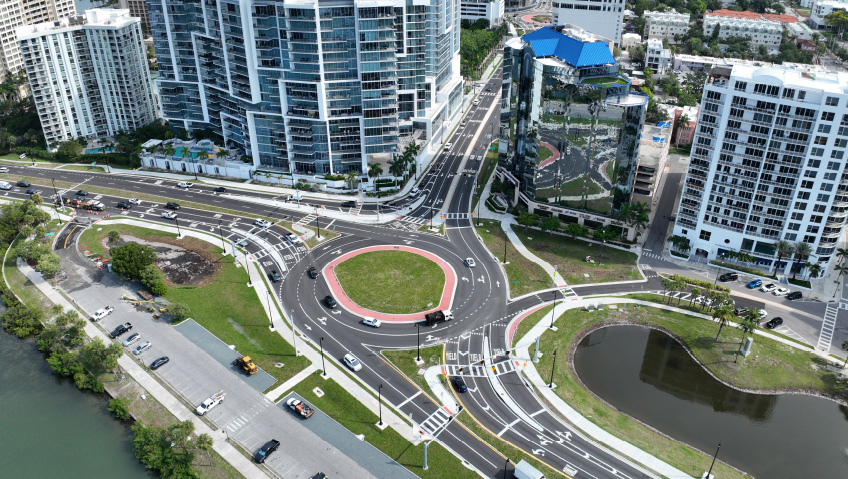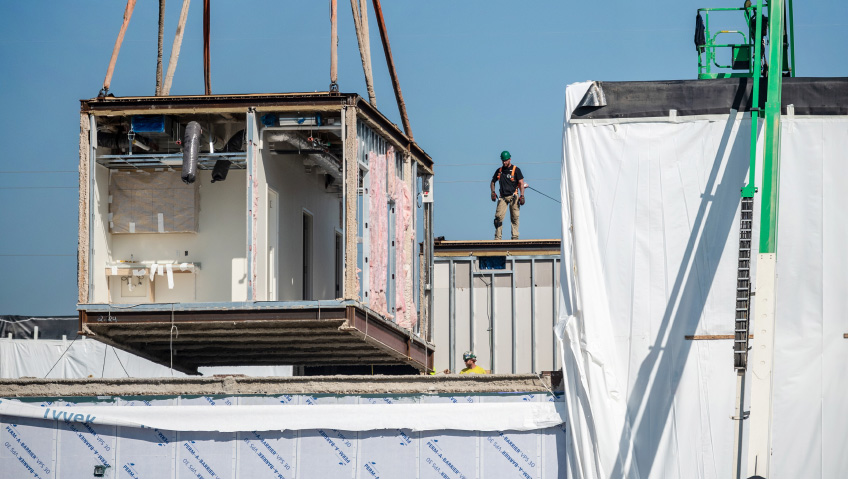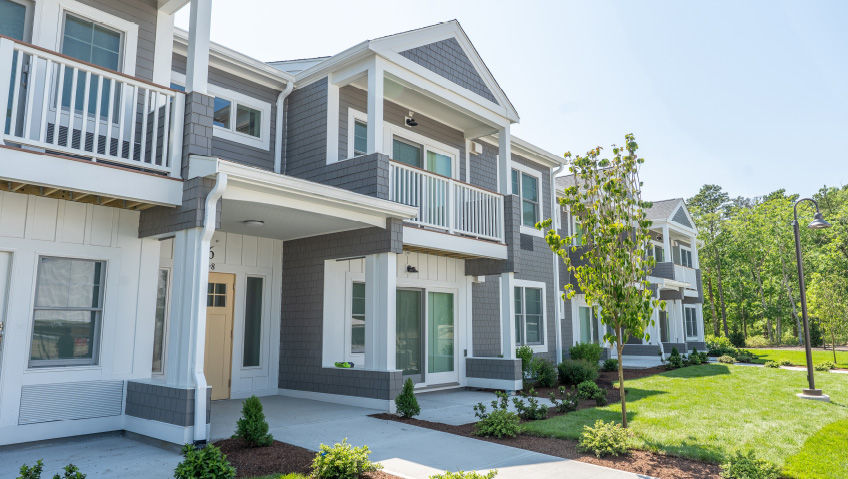The Florida Transportation Builders Association (FTBA) knows all about connecting people and organizations in the industry, supporting processes and legislation, promoting quality work, and exploring avenues to statewide improvement. Representing an entire industry in such a busy state—more than 100,000 people connected to transportation construction—is an enormous task, especially considering how many lives and livelihoods are involved.
After nearly a century of advocating for worker safety and development, the Florida Transportation Builders Association is proud of its contribution to the state’s progress and prosperity. This team of five identifies, establishes, and maintains essential networking connections locally and across the United States. Putting its voice to good use and helping to improve standards across the board, the association is committed to making lasting change.
“Political advocacy is something anybody can do and everybody should do,” says FTBA President Dan Hurtado, who holds a master’s degree in structural engineering and was formerly chief engineer of the Florida Department of Transportation.
Since its founding in 1933, the association has guided its 540 member organizations in navigating industry challenges while shaping policies and promoting best practices. To achieve this, its efforts take various formats, such as collaborating with the Florida Department of Transportation (FDOT) to host its two-day annual construction symposium. Here, technical experts share information on current technological trends, the evolution of project delivery, and legal matters.
While the symposium covers heftier matters in a slightly more formal setting, the association’s four-day annual convention allows a moment of respite for its extensive community of suppliers, contractors, subcontractors, and others. Here, people gather and network while enjoying the chance to compare notes. “These gatherings are very important to us. We take a lot of pride in it that there are tens of thousands of people out there that we help support through [these events],” Hurtado continues.
These two annual gatherings are not the only opportunities members have to mingle. Various informal events across Florida punctuate FTBA’s calendar every year. Regular meetings address current industry issues involving transportation owners like the FDOT and others, while 10 technical committees bring stakeholders together, covering areas like traffic maintenance, lighting, and alternative contracting. In addition, they tackle challenges like safety, the state of pavements, and structural specifications, drawing on the expertise of a large variety of professionals.
Transportation construction contractors represent the majority of FTBA’s members. “Our contractors are building massive structures, hundreds of miles of roadway. They’re a sophisticated group, handling complex construction operations,” says Hurtado.
As a result, the association is a repository for vast amounts of technical expertise, from which members benefit. Beyond providing technical expertise, it also offers support in legal matters. “Whenever there are contract disputes between transportation owners and contractors, often FTBA will help bring issues to resolution,” Hurtado says. When it comes to contractual disputes, he counsels those in the industry to always consider the actual content of a contract and its meaning first and, following this, to consider what is fair and what would preserve the relationship between the client and the service provider before deciding on an optimal route of action.
Time has taught him that this sage advice is incredibly valuable. “Sometimes, folks can’t get past the first consideration of understanding the content of their contract,” he explains. As a result, conflict resolution guides the parties toward finding “win-win” outcomes. These solutions often preserve the relationships that are crucial to successful projects.
FTBA also engages in political advocacy, engaging with transportation-positive candidates who appreciate that planning and executing such large, expensive projects may take decades to complete. This aspect of its work means that FTBA, as an organization, holds a long-term view of transportation infrastructure development. “Transportation is a multi-year effort. Because of this, FTBA’s political advocacy focuses on the long-term outcomes rather than short-term victories,” says Hurtado.
Following these efforts, the association plays a vital role in educating officials on the realities of the industry, its processes, and the benefits for the state of maintaining a well-funded, well-run transportation system. Within this context, one of the main points it emphasizes is that navigating transportation funding cannot be adjusted in the blink of an eye, but is rather a process of patience, endurance, and attention to the fine print.
As Florida’s state gas tax—which, according to Hurtado, generates billions annually—funds the state’s transportation trust fund, which funds FDOT’s work program, FTBA is responsible for ensuring that that money is indeed directed to the designated areas as planned, rather than diverted. Here, transparency, advocacy, and education lead the way to help keep everyone informed and focused as to its purpose.
Moreover, the association concerns itself with the quality of workforce recruitment and development. Providing a range of courses and upskilling opportunities, it also promotes the industry to young people looking to create well-paid futures without incurring massive student debt. Part of this mission includes a team with heavy equipment simulators that give kids an exhilarating chance to feel what driving cranes, bulldozers, and other construction vehicles is like. Naturally, this school-based event is always a hit.
As part of these efforts, the association ensures students who are passionate about the industry have the funding they need for education. FTBA has provided over two million dollars in scholarships, providing over 500 students with access to college and trade school educations. The scholarships provided “are something we are very proud of,” Hurtado adds with a smile. The number of lives the association has changed and improved directly and indirectly through these continued efforts is nothing short of remarkable.
Other programs include the FTBA commercial driver’s license training program that supports people in the industry in qualifying as heavy-vehicle drivers. FTBA also creates opportunities for employers to further develop promising younger staff through its Emerging Leaders Academy.
Florida is home to around 24 million people, hosting an estimated 143 million visitors every year whose spending reaches hundreds of millions of dollars. One economic driver is that Florida is the country’s leader in small business startups, leading the association to constantly remind its members that remaining up-to-date and engaged with industry developments and state-wide growth is imperative to continued prosperity.
That means that the state relies on strong transportation infrastructure to earn its annual gross domestic product of 1.47 trillion dollars, which, if it was an independent, self-governed nation, would put it 13th on the global earnings scale, perched between Australia and Mexico—a tremendous achievement for the people of this productive place. “If there is anything FTBA is proud of, it is our role in promoting a healthy and vibrant state economy,” Hurtado says.
Being such a busy place, traffic management is crucial to keeping everyone safe and the state functioning as it should. Whereas the historic approach saw more roads built to accommodate more traffic, the modern ethos leverages technology to regulate traffic in smarter ways—as far as possible.
In addition, the association takes it upon itself to explore new technologies, and it is common for vendors to team up with FTBA to further develop, refine, or qualify their products. In this way, it helps secure continuous evolution on the product and construction front in this bustling state.
But it is not just road user safety this team is concerned with; highway worker safety is another top priority, as is paying respects to those who have lost their lives serving the state. The association is currently creating a memorial “to highway workers who have lost their lives in service to the state [which] will be displayed at an FDOT roadside park,” highlighting the association’s commitment to raising awareness.
Looking ahead, FTBA looks forward to expanding its influence locally and nationally. Beyond that, continuing to secure a well-trained, efficient future workforce for Florida is one of its greatest goals. To this end, its approach includes continuing to recruit students, veterans, and employees looking to make a change to create better lives for themselves by joining the transportation construction field.
Hurtado’s message to prospective employees is one of welcome and promise. “A career in road and bridge construction is challenging and rewarding, demanding and honest, exciting and fulfilling. It is a promising career that keeps every promise that it makes. Dirty hands earn clean money.”






